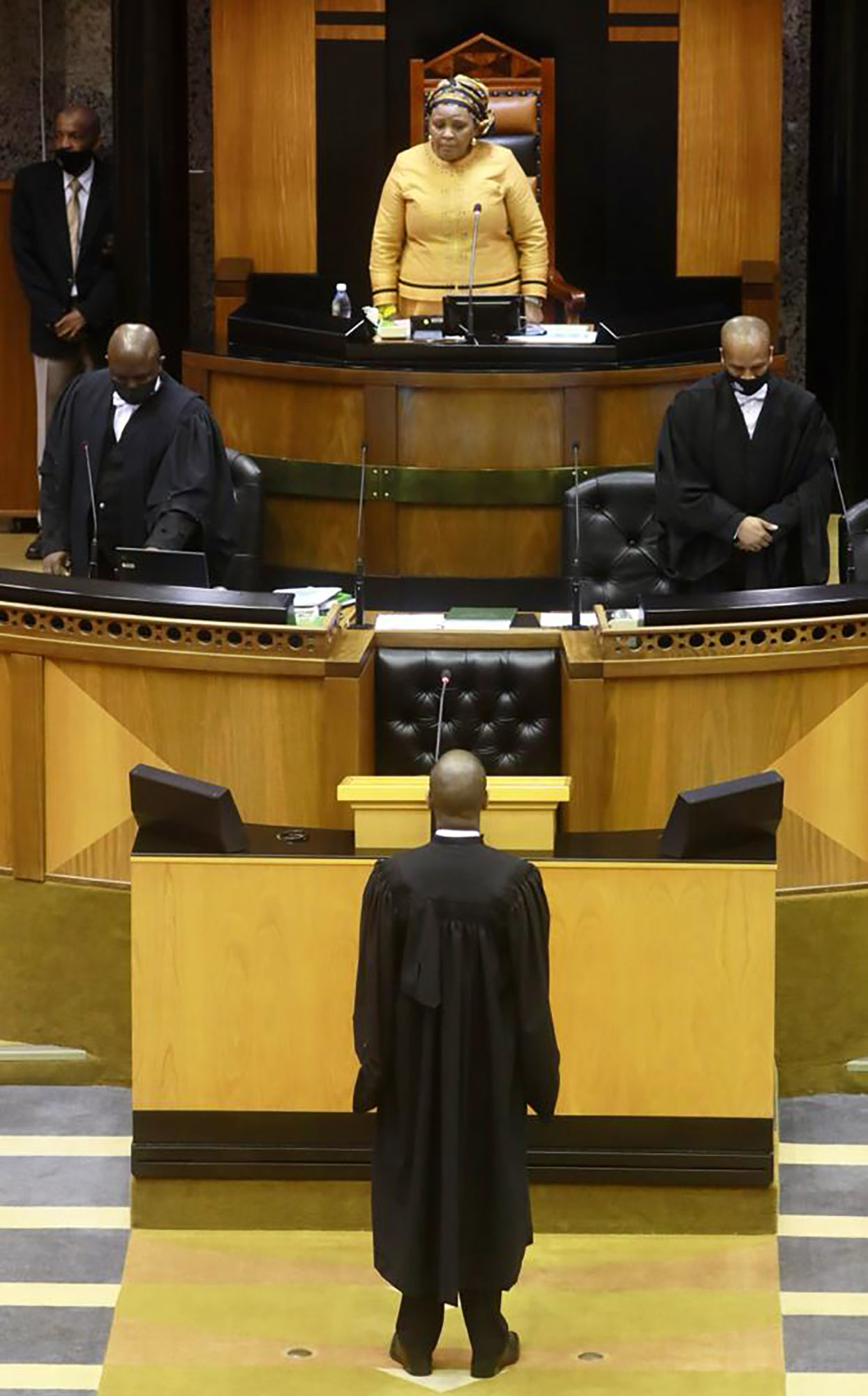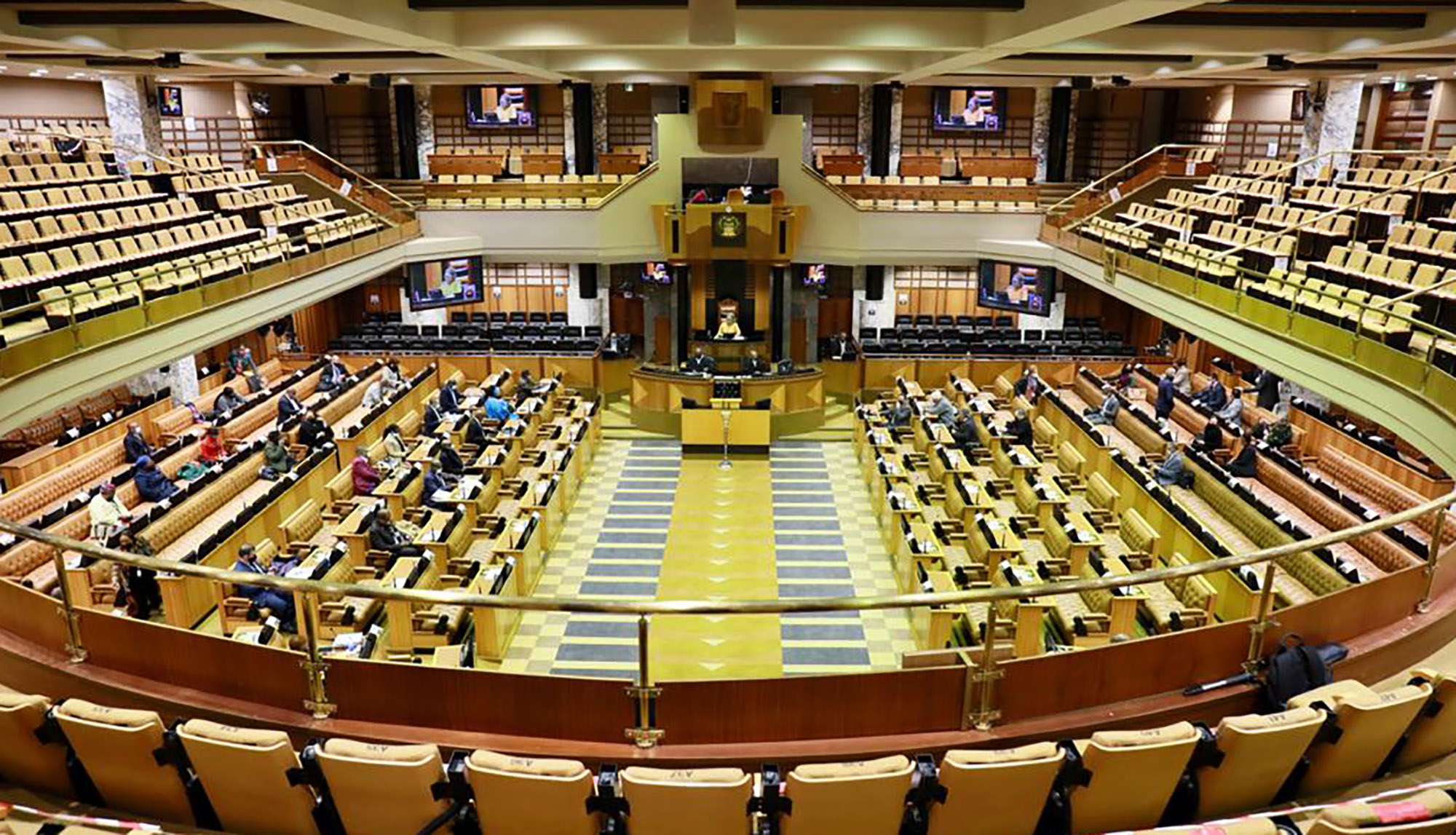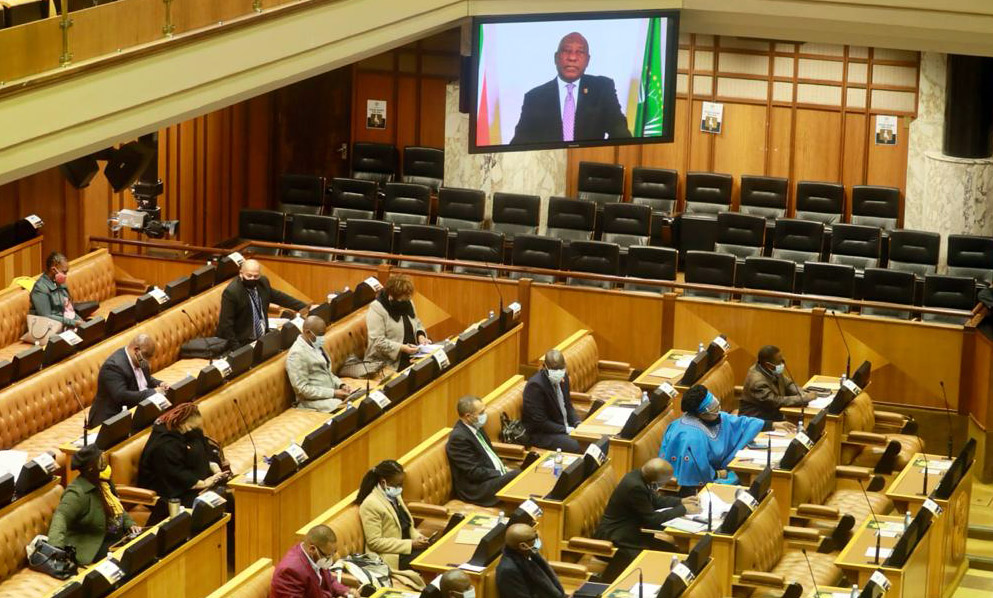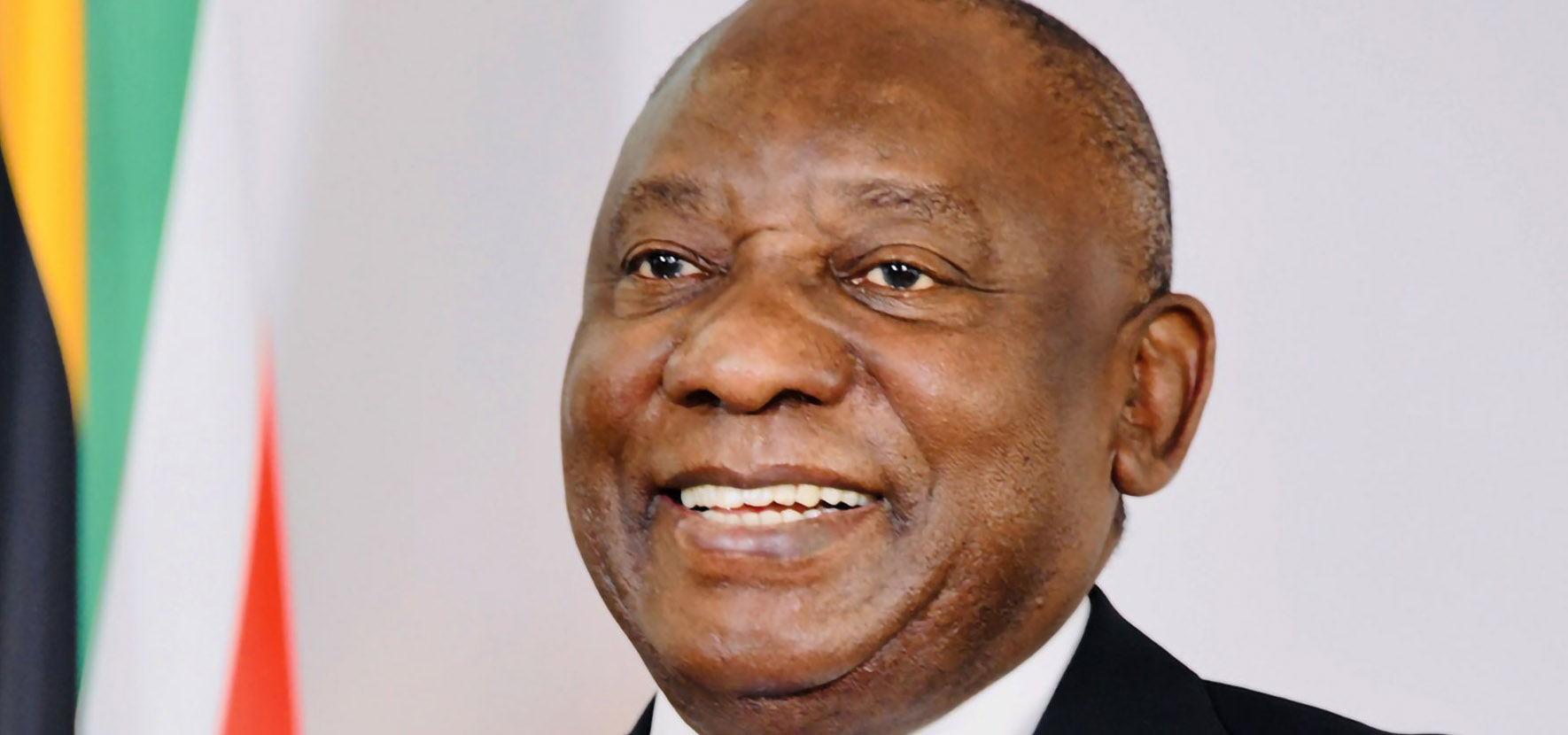It was DA leader John Steenhuisen’s request early on for an assurance from President Cyril Ramaphosa that he was alone, and not being coached in his answers from the virtual platform, that got ANC hackles up.
ANC Chief Whip Pemmy Majodina was on her feet, saying that this already had been raised elsewhere — and in doing so spilled the beans on the traditionally closed-door meeting to facilitate cross-party cooperation for Parliament’s smooth running.
“We cannot allow insinuations and undermining of the intellect of the president. This has started somewhere and we decided not to respond. But now this is brought here…” said Majodina.
“They must bring evidence because now they are undermining the president… We cannot allow the leader of the DA to come make a mockery of the president.”
That got DA Chief Whip Natasha Mazzone on her feet, saying she had been whithin her rights to tackle this matter in the closed meeting.
“The fact of the matter is that when I raised this issue in the Chief Whips’ Forum, I mentioned that you could see the shadows of people walking in front of the president.
“Now there are certain issues that cannot be ignored. One of the big issues is that the counsel to the president, Mr (Gerhard) Koornhof, is not in the House. We would like to know why that is?”
National Assembly Speaker Nosiviwe Mapisa-Nqakula left this hanging without a ruling.
“This is not an opportunity for a debate among ourselves. This is an opportunity for the president to address the nation on those matters on the question paper.”
And then it was onto the next follow-up question within the question.
The dig from Freedom Front Plus leader Pieter Groenewald that he didn’t mind the president asking for assistance seemed to rankle Ramaphosa.
“I can tell you with great certainty I don’t need any assistance to answer your questions or any questions indeed. The suggestion that I am coached is quite demeaning. And it shows the extent the leader of the opposition (Steenhuisen) has lost it…”
 Speaker of Parliament Nosiviwe Maphisa-Nqakula during president Ramaphosa 's oral replies in the National Assembly, 3 September 2021. (Photo: Zwelethemba Kostile/GCIS)
Speaker of Parliament Nosiviwe Maphisa-Nqakula during president Ramaphosa 's oral replies in the National Assembly, 3 September 2021. (Photo: Zwelethemba Kostile/GCIS)
The ANC benches cheered and applauded. And the tone was set for the presidential Q&A over the next three-plus hours, particularly as Steenhuisen got in a follow-up question in just about all of the five questions that were not his own.
His own question on the criteria for Cabinet appointments segued into whether South African taxpayers paid for Deputy President David “DD” Mabuza’s weeks’ long medical treatment in Russia.
“What a vote of confidence in the SA health system and your plans for NHI (National Health Insurance),” said Steenhuisen.
Ramaphosa replied it was “not only unkind but I find that quite terrible really”, but backed his deputy’s travel abroad with his security detail to obtain medical treatment.
“The Honourable Steenhuisen is entitled to get into tirades and make various statements about members of the National Assembly. Some measure of kindness is required when someone is not well…”
But clearly, the DA commentary on shadows, coaching and assisted answers seemed to niggle. Or perhaps Ramaphosa decided to give an answer in his own time, on his own terms.
That time came five questions later after the questioner National Freedom Party (NFP) MP Shaik Emam mentioned “shadows” again.
“The only shadow I see is my own shadow when I move,” replied Ramaphosa, adding his parliamentary counsellor Gerhard Koornhof was not truant, but also not coaching him. “I can assure you he’s not with me. He’s not with me right now.”
Like he defended his parliamentary counsellor, Ramaphosa defended his ministers and deputy ministers who had to appear before the State Capture commission to explain themselves.
And in response to IFP MP Mkhuleko Hlengwa’s call for details on why people are appointed ministers, Ramaphosa asserted his right not to have to explain.
“The president does not have to give any explanation.
“The construct of our democracy is that the president has the prerogative… The president alone exercises that prerogative.”
 The National Assembly, South Africa on 3 September 2021. (Photo: Zwelethemba Kostile/GCIS)
The National Assembly, South Africa on 3 September 2021. (Photo: Zwelethemba Kostile/GCIS)
But Steenhuisen’s repeat follow-up questions pushed the presidential buttons.
Monopolising questions for himself meant, according to Ramaphosa, “most of the members in the DA are being bludgeoned into submission… and that the supreme leader should be the only one asking questions. That passes a very sad image of a party of opposition. Quite sad.”
Steenhuisen was on his feet. The president would be aware that in parliaments the world over it’s the leader of the opposition that’s up during prime minister’s questions.
Ramaphosa shot back to say South Africa was not any other country — and then got personal.
“It’s this problem of mimicking, and including the shrill voice he (Steenhuisen) asks questions. … He should go to voice training…” A better voice might lead to better quality replies seemed to be the insinuation.
The DA wanted Ramaphosa to withdraw this unparliamentary remark. Mapisa-Nqakula did not make a ruling, and after being asked again to do so said that while what the president had said seemed not to be on the dos and don’ts list she got, she’ll revert to the House later.
Ramaphosa made it easier for her.
His comments were not meant to cast aspersions and to the extent they were hurtful, Ramaphosa said, “I withdraw so they don’t even become an issue in Parliament.”
It was the end of a terse presidential question session overshadowed by political barbs and politicking — regardless of the ANC sweetheart questions to enable Ramaphosa to repeat his administration’s efforts from the reintroduction of the Covid-19 relief of social distress grant, support to uninsured small businesses damaged in the July violence and public disorders, and appeals to get vaccinated.
Ears may have pricked up when Ramaphosa talked of “further reforms” to ensure relief in youth unemployment that runs around 75%, while joblessness rose to 44.4% on the broad definition including those too disheartened to even try to find work.
 President Ramaphos answers questions in the National Assembly, South Africa on 3 September 2021. (Photo: Zwelethemba Kostile/GCIS)
President Ramaphos answers questions in the National Assembly, South Africa on 3 September 2021. (Photo: Zwelethemba Kostile/GCIS)
A hint was also given of work being done on additional measures for economic growth: “We will be articulating this in time to come,” said Ramaphosa — as the time had come to assess progress and choices.
A hint came of some sort of settlement on the litigation over spectrum auction by the end of September after MTN and Telkom, joined by e.tv, in March 2021 interdicted the spectrum auction over the terms set by the regulator, the Independent Communications Authority of South Africa (Icasa).
On Friday again Ramaphosa appealed to litigants to find each other in an agreement, as the delays in spectrum auction undermined economic recovery efforts. He last did so after his Presidency Budget debate in June.
Another hint of economic change came when Ramaphosa, again, expressed his dissatisfaction over the lack of uptake of the banking sector’s facilitated R200-billion loan scheme to support business during Covid-19 lockdown, now in day 526.
“I have instructed that it (the loan scheme) be looked at afresh to make sure it works better,” Ramaphosa told MPs. “I want to see this scheme recast and recalibrated. I have told the financial sector I am not happy about this.”
With only hints on offer, perhaps it’s no surprise bruising politicking took over. Municipal elections or not on 27 October, Friday’s presidential Q&A signals the cracks in South Africa’s politics go deep. DM




 President Ramaphosa is answering questions in the National Assembly. South Africa on 3 September 2021. (Photo: Zwelethemba Kostile/GCIS)
President Ramaphosa is answering questions in the National Assembly. South Africa on 3 September 2021. (Photo: Zwelethemba Kostile/GCIS) 